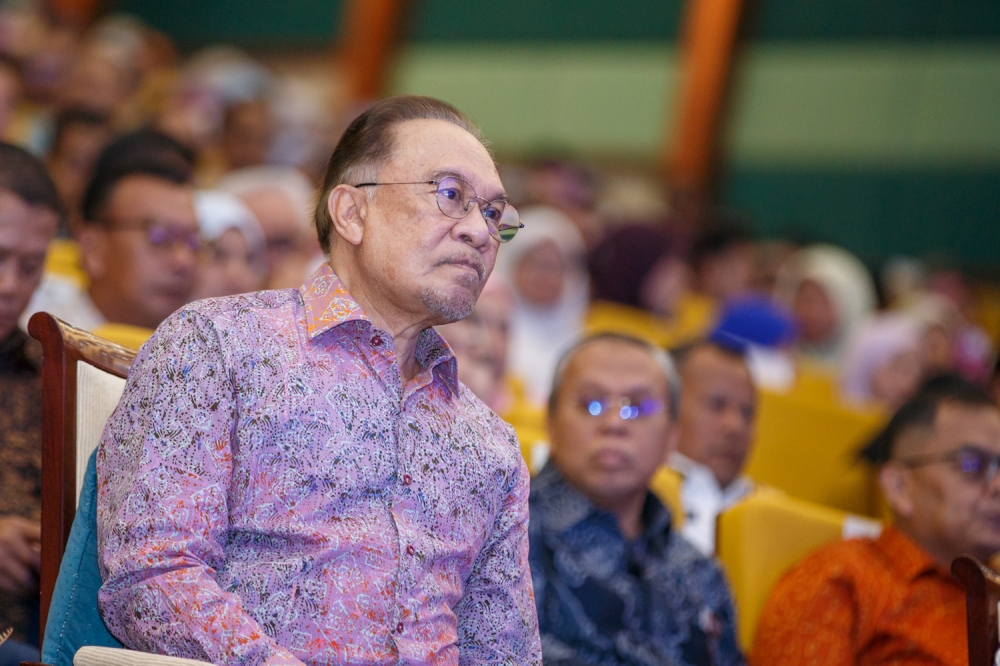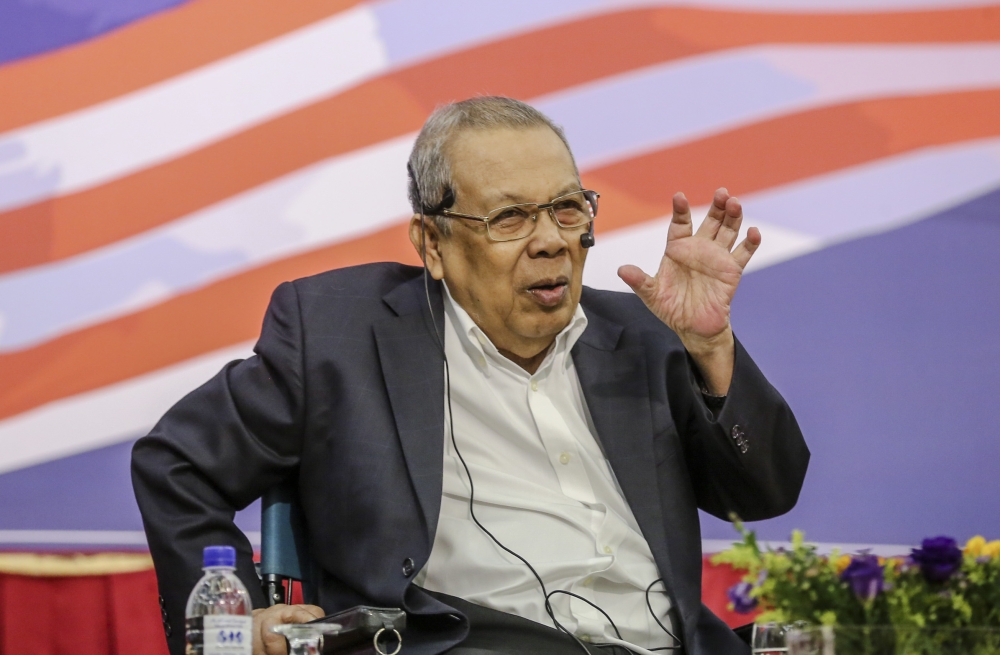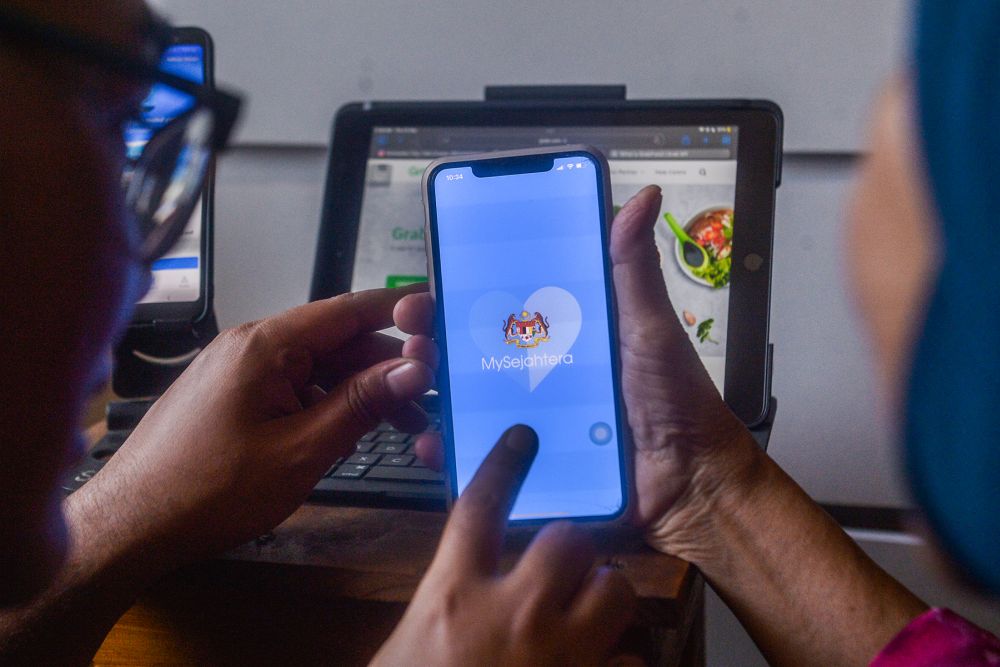KUALA LUMPUR, Sept 24 — Chin Lam, 67, has been a businessman for decades, and yet he said he finds it hard to trust online banking services.
“I feel like somebody can observe what I’m doing, so I’d rather go to the bank and get things done,” he told Malay Mail, admitting that he gets his daughter to perform his online transactions and other banking matters when necessary.
“Anything that asks for passwords and stuff I normally don't use, because we are quite forgetful,” he said, adding that while he is far more familiar with social media platforms Facebook and WhatsApp, he does not quite get LinkedIn.
Another sexagenarian, Sarawasthy Lechumanan, said while she can make banking transactions and surf through video platform YouTube quite easily, she struggles with using the Grab superapp that handles various things from ride-hailing to food deliveries.
“I don’t know how to book a Grab [ride] or order food. I have never done it before and don’t have the app either. Also, my phone isn’t that good, if I download too many apps there won't be enough space in it,” she said.
As most brick-and-mortar stores went through Covid-19 lockdown last year, the Department of Statistics Malaysia recorded that e-commerce businesses earned a cumulative income of RM896.4 billion — a jump of 32.7 per cent compared to 2019.
From restaurants to shopping, many stores went online to weather the pandemic. The situation is similar with consumers, who turned to online transactions to reduce risks of Covid-19 by staying home and reducing face-to-face interactions.
However, this situation has left behind the elderly who are not fully equipped to conduct their lives online unlike generations who grew up with information technology, several advocates of digital inclusivity told Malay Mail.

Sritharan Vellasamy, founder and chief executive of Wordlabs Global Sdn Bhd — a company specialising in communications and consulting surrounding technology adaptation — said the situation is exacerbated as government agencies are helping drive more of our economy online, causing a “digital divide” between the young and the elderly.
“The government is encouraging digital adoption as set out in Budget 2020 where it provided RM500 million over five years or a 50 per cent matching grant of up to RM5,000 per company to digitalise their business operations.
“Also, in November last year, Malaysia set up the National Digital Economy and 4th Industrial Revolution Council to boost local capabilities and embrace digitalisation,” he said, adding that these efforts were especially important for economic growth and business survival.
Nonetheless, he said that education and support for the elderly is sorely lacking in terms of helping them learn the required skills to fully use digital technology and meet their daily needs.
Of the same view is Rachel Gong, a senior research associate at think tank Khazanah Research Institute focusing on digital policy, who said that despite indications that more senior citizens have adopted digital technology over the years, key problems still persist.
“Older internet users who have limited technological exposure and experience may find themselves at greater risk of becoming victims of cybercrime, especially fraud and scams, or distributors of misinformation on social media.
“Reports indicate that there are seniors unfamiliar with terminology, including cashless and online payments who are struggling to find appropriate education, guidance, and support.
“Seniors also report less experience with computers, the internet, and technology in general. As such they are uncomfortable with the pace at which digital technology evolves and may be reluctant to try relatively more complicated tools such as cashless online payment apps even as they embrace social media and messaging apps,” she said.
Azrina Kamaruddin, an academic from Universiti Putra Malaysia’s Faculty of Computer Science and Information Technology said that the design of digital tools, such as websites and smartphone applications, are often themselves flawed and do not carefully consider how usable they are.
“It may be Malaysian culture to think that when we can’t get an app to work, it’s our fault. But it’s not, it’s often the design’s fault,” said Azrina, who studies human-computer interaction, including user-centered design for the elderly.
“Systems designers often stop their design efforts once the intended functionality is achieved and often don’t care much about usability.
“For example, I’ve seen many apps where they put every possible function on the home page. This may be able to be navigated by some professionals, but will not be usable to the elderly,” she added.
So how can we help the elderly cope?

As of 2020, DoSM recorded that 10.7 per cent of the Malaysia population was made up of those aged 60 and above, amounting to some 3.5 million people.
The Malaysian Communications And Multimedia Commission in its Internet Users Survey 2020 report showed that 11.3 per cent of Malaysians were non-internet users.
Among those non-internet users, 51.8 per cent were reported to be aged 60 and above. The top reasons given across all age groups for not using the internet were “lack of interest”, “too old to learn” and “no device”.
The pandemic and the government’s handling of it has relied a lot on technology, with apps such as Putrajaya’s MySejahtera and Selangor’s SELangkah — where users were required to “check in” at all places in order for easier contact tracing of infections.
The opt-in for the AstraZeneca vaccine rollout was also done through booking on a website, which was riddled with technical glitches. Many users have reportedly been helping their friends and family to register, especially for the elderly.
Cashless transactions also went up, with e-wallets such as Grab, Touch N Go, and Maybank’s MAE became preferable to prevent coronavirus transmission.
Meanwhile, more information and data on the pandemic and the lockdown from Ministry of Health and the National Security Council are made available on their websites, social media accounts, and through text messaging groups — not exactly intuitive for those unfamiliar.
For Sritharan, the encouragement for the not-so-tech-savvy elderly to deal with situations such as this has to come from the government, as he urged for more digital education drives for the elderly.
"Programmes like Senior Technology Workshops help to introduce senior citizens to the use of digital technology, but government agencies need to step up and execute more concerted efforts in this area,” he said.
Gong, also espoused the need for education, especially in regards to protecting the elderly from online scams and misinformation.
“So improving not just digital skills — how to use apps, devices and the internet — but also digital literacy — how to evaluate misinformation or how to protect their passwords — would help,” she said.
Nonetheless, Gong said, it was more important to have systems and app designers think about how their products will be used and viewed by seniors, as not everyone can be asked to become a digital expert.
“I think the government can set a good example by redesigning some of their apps and websites to be more user-friendly. Bigger print, for example, or sites that are more intuitive to navigate, will help seniors come on board.
“That being said, we need to also make sure there is a non-digital solution for people, not just seniors, who may find rapid digital adoption too challenging.
“For example, street parking apps in Kuala Lumpur. It’s a great initiative, but if someone doesn’t have a smartphone, or there is no signal or connectivity in the area, how can they pay for parking?
“There needs to be a backup non-digital solution even as we move forward with digital adoption,” she said.
Azrina meanwhile urged businesses and the government to invest more resources into usability studies and testing.
“They can study things such as the complex terms used in online banking tools, and see how they are perceived by the elderly and what can be changed.
“Perhaps they can also reduce the number of pages and menus one has to go through to get simple things done.
“Prioritise designing for the elderly. If you can tackle design problems for the elderly, then you’d be tackling problems for all. Professionals would definitely be able to use an app if the elderly can use it,” she said.


















